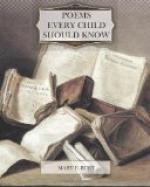’Twas vain the loud waves
lashed the shore,
Return or aid
preventing;—
The waters wild went o’er
his child,—
And he was left
lamenting.
THOMAS CAMPBELL.
THE CHARGE OF THE LIGHT BRIGADE.
“The Charge of the Light Brigade” (1809-92) unlike “Casabianca” shows obedience under stern necessity. Obedience is the salvation of any army. John Burroughs says: “I never hear that poem but what it thrills me through and through.”
Half a league, half a league,
Half a league
onward,
All in the valley of Death
Rode the six hundred.
“Forward, the Light Brigade!
Charge for the guns!”
he said:
Into the valley of Death
Rode the six hundred.
“Forward, the Light Brigade!”
Was there a man dismay’d?
Not tho’ the soldier
knew
Some one had blunder’d:
Theirs not to make reply,
Theirs not to reason why.
Theirs but to do and die:
Into the valley of Death
Rode the six hundred.
Cannon to right of them,
Cannon to left of them,
Cannon in front of them
Volley’d
and thunder’d;
Storm’d at with shot
and shell
Boldly they rode and well,
Into the jaws of Death,
Into the mouth of Hell
Rode the six hundred.
Flash’d all their sabers
bare,
Flash’d as they turn’d
in air
Sab’ring the gunners
there,
Charging an army, while
All the world
wonder’d:
Plunged in the battery-smoke
Right thro’ the line
they broke;
Cossack and Russian
Reel’d from the saber-stroke
Shatter’d
and sunder’d.
Then they rode back, but not
Not the six hundred.
Cannon to right of them,
Cannon to left of them,
Cannon behind them
Volleyed and thundered:
Stormed at with shot and shell,
While horse and hero fell,
They that had fought so well
Came through the jaws of death
Back from the mouth of hell,
All that was left of them—
Left of six hundred.
When can their glory fade?
Oh, the wild charge they made!
All the world
wondered.
Honour the charge they made!
Honour the Light Brigade—
Noble six hundred!
ALFRED TENNYSON.
THE TOURNAMENT.
There are several of Sidney Lanier’s (1842-81)
poems that children love
to learn. “Tampa Robins,” “The
Tournament” (Joust 1.), “Barnacles,”
“The Song of the Chattahoochee,” and “The
First Steamboat Up the
Alabama” are among them. At our “poetry
contests” the children have
plainly demonstrated that this great poet has
reached his hand down to
the youngest. The time will doubtless come
when it will be a part of
education to be acquainted with Lanier, as it
is now to be acquainted
with Longfellow or Tennyson.




